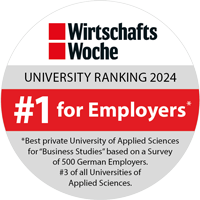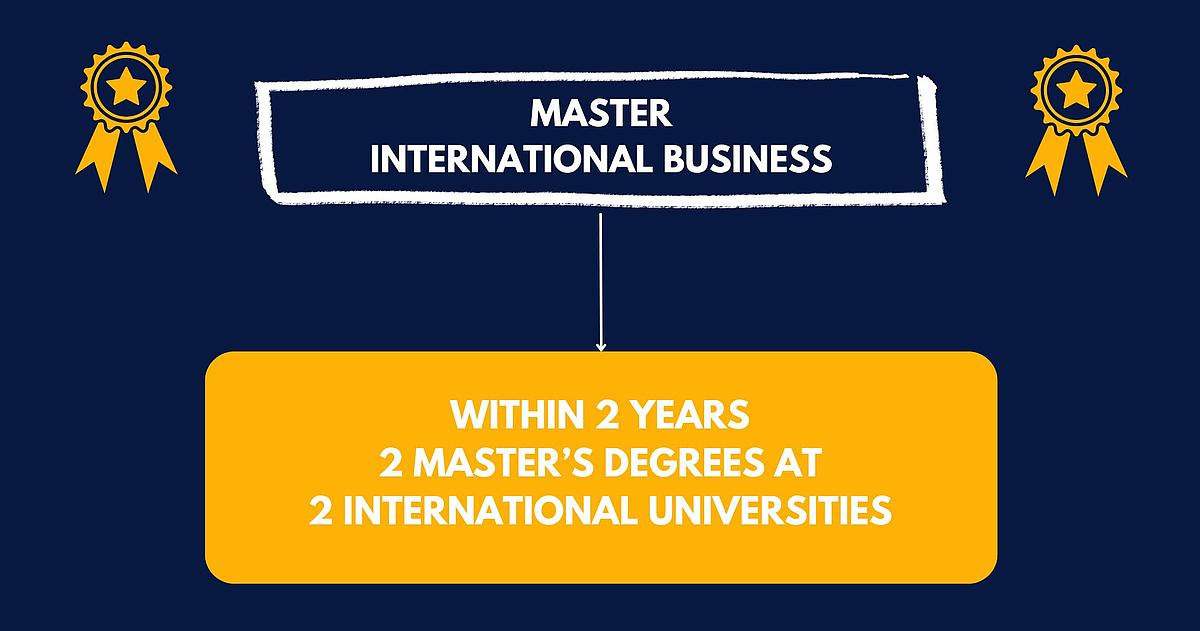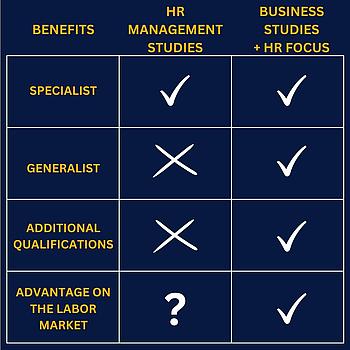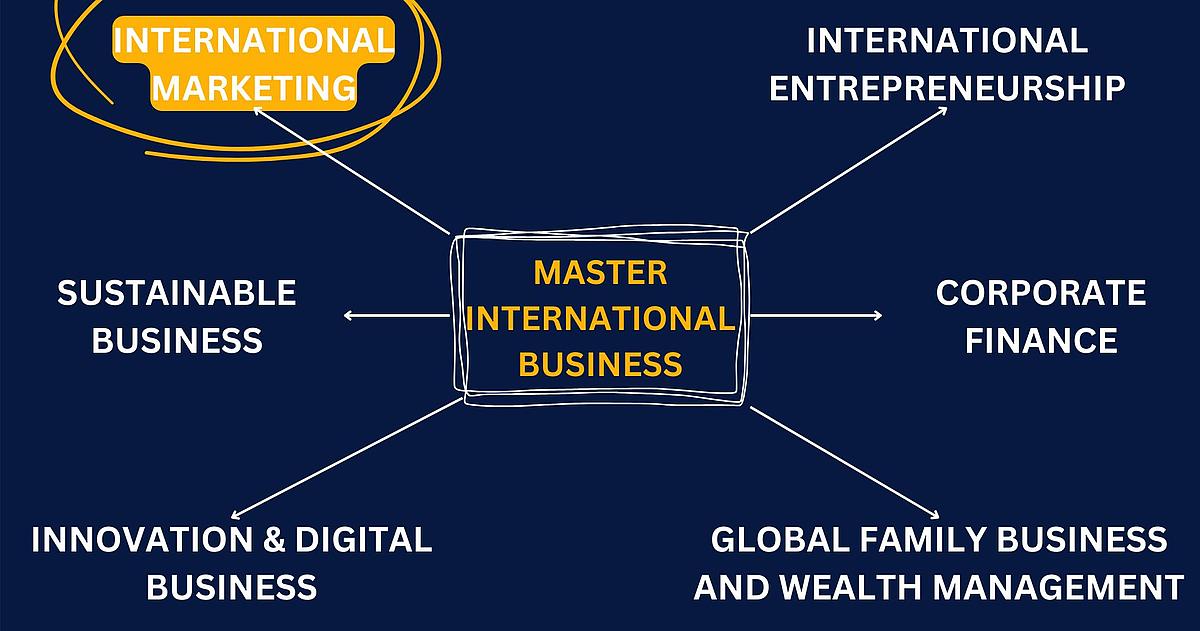This Website uses cookies to improve your visit on our website. More Info
HR Manager
- MBS QUICK FACTS:
- State-recognized since 1999
- February and September
- 18 or 24 Months
- English
- Book a consultation appointment

DID YOU KNOW?
In 2024, Munich Business School secured the top spot among private universities of applied sciences in the field of business administration from a recruitment perspective for the fifth time in a row.
Human Resource Management encompasses all strategic and operational tasks related to the administration, development and leadership of employees. It aims to attract the right talent, develop their skills in a targeted manner and create a positive working atmosphere that contributes to the achievement of corporate goals. This includes areas such as workforce planning, recruiting, training, performance management and employee retention, as well as administrative tasks such as payroll and labor law. Human Resource Management is therefore a central factor in the long-term success and competitiveness of a company.
Download Information Material
In our exclusive and non-binding information material, you can find out everything you need to know about:
To start a Master's in Human Resource Management, you usually have to fulfill certain requirements. These may vary depending on the university and country, but typically the following requirements can be expected:
In general, a background in economics or social science is ideal for many Master's programs in Human Resource Management, but other Bachelor's degrees may also be accepted, depending on the curriculum and specialization.
The following diagram shows the main advantage of the MBS Master International Business program.

There are a number of advantages and reasons why students and professionals choose to specialize in Human Resource Management:
A Master's in Human Resource Management thus lays the foundation for a fulfilling and varied career in Human Resources, strengthening the skills needed by companies today and in the future.
At Munich Business School, you can study for a Master International Business. This will give you the perfect mix of Business Studies knowledge and experience in Human Resource Management, enabling you to shape your future according to your own ideas. These are the most important facts about studying at MBS:
18 or 24 Months
Master of Arts
February & September
Master in International Business
English
EUR 8.580 per Semester
In person at the campus in Munich
Dual Degree, Mentoring Program & 57% International Students
Choose 2 out of 7 specialization areas
Advantages and disadvantages of a
Human Resource Management Master
| Advantages | Disadvantages |
|---|---|
| In-depth specialist knowledge: Imparts in-depth knowledge of HR strategies, personnel development, labor law and leadership. | Time-consuming and costly: A master's program usually takes 18 months to 2 years to complete and is often costly. |
| Better career opportunities: A master's degree increases your chances of getting a senior or specialized HR role. | Professional experience preferred: Some positions require practical experience, which is only taught to a limited extent during your studies. |
| Advanced leadership skills: Develops soft skills such as communication, negotiation, and leadership. | High competition: Demand for senior HR roles is high, so competition for attractive positions can be intense. |
| International focus possible: Many programs offer an international focus or exchange opportunities. | Limitation to the HR area: A Master's in Human Resource Management is very specialized, which makes it difficult to switch to other professional fields. |
| Network development: Opportunity to make valuable contacts with fellow students, lecturers and industry experts. | Differences in salary levels: Starting salaries can vary greatly depending on the industry and location. |
| Current topics and trends: Course content often includes digitalization, diversity management and new working models that are relevant for the future. | Theoretical focus: Some programs place a strong emphasis on theory, which can reduce the practical relevance compared to work experience. |
| Attractive starting salary: Graduates can often start their careers with an above-average salary. | Regional and industry-specific differences: Salaries and career prospects vary greatly depending on the region and industry. |
This overview will help you to weigh up the most important advantages and disadvantages of a master's degree in Human Resource Management.
A Master's degree in Business Studies with a focus on Human Resource Management offers you a more comprehensive and versatile foundation than a degree program that focuses solely on Human Resource Management.

This broad economic understanding is particularly valuable because human resource management is directly related to corporate goals and processes, and knowledge from these areas can significantly improve the quality of your work in human resource management.
With a solid foundation in Business Studies, you can understand the importance of the HR area in the context of the entire company and better assess how your work contributes to value creation and the achievement of corporate goals. In your master's degree, you can then deepen your knowledge of human resource management and specialize in strategic and operational topics in the HR field. The combination of general business skills and HR know-how will give you greater flexibility in the job market and open up a wider range of career opportunities, including business consulting, strategic management positions, or related fields where pure HR knowledge may not be sufficient.
In summary, a Business Studies degree with a focus on Human Resource Management enables you to better understand the company as a whole and to strategically shape the role of the HR department, which can give you a clear advantage in the competition for demanding positions.

The Munich Business School offers more than just a classic business studies degree – it focuses on internationalization so that you can get off to a flying start worldwide after graduating. The Master's program in International Business at MBS offers special highlights such as semesters abroad, internships, business projects and a wide range of networking opportunities. You can look forward to small study groups, dedicated teachers and programs that have already received multiple awards. What is particularly You are not just a number, but the personality that motivates our work. As a small, private university, we take time for your individual concerns and offer you a customized study experience. Our lecturers have extensive practical experience and teach you skills that really count. In addition to in-depth knowledge in Human Resource Management, we emphasize sustainability and social responsibility and prepare you optimally for various professional fields.
Munich Business School offers its students many advantages that are only possible through the structure of a private university. You will benefit from the following advantages during your studies at MBS:
Professors with business experience and specialists as guest lecturers
Small class sizes and individual support through mentoring programs, for example
in Finance and Management
Broad Business Studies & Specialization through 2 elective specializations
Students from all over the world & many networking opportunities
A master's program in Human Resource Management typically includes a combination of business fundamentals, in-depth HR-specific topics, and practice-oriented and interdisciplinary content. These course contents provide comprehensive preparation for various positions in the HR field and give a deep insight into current challenges and developments in Human Resource Management. Here is an overview of the common course contents:
Do you see the world as your oyster and are you aiming for an international career? Then the Master's in International Business Management at MBS is perfect for you! Here you will not only deepen your knowledge of the fundamentals of economics, but you will also become an expert in various fields and hone your personal profile by choosing individual specializations. With the integrated semester abroad, you will be optimally prepared for specialist and management roles in the global economy. If you want to gain even more international experience, you can complete a second semester abroad and thus acquire two specialized master's degrees in just two years. So nothing stands in the way of your international career with a master's in international business!
The specific modules of the Master's program in International Management prepare you excellently for a career in international business. To ensure practical relevance during your studies, the Master's program offers targeted concentrations in addition to general business administration and courses such as international marketing and international finance. In the first and second semesters, you choose two out of five or seven business concentrations, respectively, giving your studies an individual touch. You can choose topics such as digital business management, international marketing or corporate strategy & innovation. These advanced courses give you the opportunity to deepen your skills in a targeted way and prepare you optimally for your future career.
The studies at MBS focus on the international market. A large part of the course content is taught in English and MBS students come from all over the world.
Internationality is also expressed through the semester abroad. Students spend the last semester at one of our more than 60 partner universities around the world.
Students work on a business project for a real company. In doing so, they apply the theoretical knowledge gained during their studies in practical applications.
The following scheme shows all the specializations that you can choose for your Master International Business studies at Munich Business School, including Human Resource Management in the form of International Marketing.

The English-language Master's program in International Business with a specialization in International Marketing will lead you to a Master's degree in just 18 months. During the first two semesters at the Munich campus, you will learn how to plan and implement successful marketing campaigns. You will develop the ability to analyze complex marketing-related challenges and solve them in a targeted manner. You will also be prepared to use modern digital marketing tools efficiently. In addition to your focus on international marketing, you can choose an additional area such as corporate strategy and innovation to customize your profile.
Interactive lectures and the business project with a real company will give you a practical education and the opportunity to apply what you have learned directly. Working closely with your fellow students will foster your teamwork skills and prepare you for a career in marketing. The direct cooperation with the company gives you the opportunity to gain valuable practical experience and make valuable contacts in the industry.
In the third semester, you will attend one of over 60 partner universities worldwide. This semester abroad offers you the opportunity to get to know a new country and a different culture, while growing both professionally and personally. Here you will gain valuable international experience in marketing that will enrich your professional prospects. After that, you will write your master's thesis.
If you have any further questions or need more information, please do not hesitate to contact our student advisory service.
Application
In order to qualify for the Master International Business study program, you must fulfill academic, linguistic, and to some extent professional requirements.
You may submit your application documents at any time. Since the places are limited, we advise you to apply for your desired study start as early as possible.
The main requirement for admission to the Master International Business study program is a successful Bachelor's degree (180 ECTS or more). Applicants with a degree in Business Studies/Management/Economics are entitled to apply for the program directly, applicants without a degree in economics can qualify for the program by completing the Pre Master Program. Upon request, we will gladly verify your documents in advance. Please contact your Program Advisor.
English Proficiency
Applicants must proof their English language skills by passing one of the following language tests:
Note: If the test is also used to apply for a visa, please check the requirements of the respective embassy in advance.
Test results can only be accepted if achieved within the last two years. If you are unable to obtain your test results before handing in your MBS application, please inform us about your planned test date.
The English proficiency test can be waived by the following candidates:
We accept applications all year round. However, we recommend that you apply as early as possible, as the number of places is limited.
Spring semester (Master International Business only)
Applicants from Vietnam, China and India should allow an extra month to apply for the relevant visas.
Winter semester
Applicants from Vietnam, China and India should allow an extra month to apply for the relevant visas.
You must submit the following mandatory documents for us to consider your written application:
*Please submit the relevant original document, or a certified copy, as soon as you are accepted onto the program.
Online application:
Apply online for the Master’s program in International Business
Eligible applicants will be invited to a personal interview, either in person in Munich or online via Microsoft Teams (approx. 30–45 minutes). The interview may include examining a case study.
As soon as you are accepted onto the program, you will have the opportunity to get to know Munich Business School a little better – before you make the final decision about your studies. And, of course, our student advisors will be available to answer any questions you have.
When we confirm your place, we will send you confirmation of your acceptance along with two copies of your study contact. To secure your place, please sign and return one copy of the contract to us within two weeks. You can keep the other copy for your files.
Additionally, in order to be formally accepted onto the program, you must pay a one-off matriculation fee of €690 (EU/EFTA) or €1,490 (non-EU) and make an advance payment of €1.990. This advance payment will be deducted from your first tuition fee payment.
If you are a non-EU citizen, you must apply for a student visa in order to start your studies in Germany. You will require a letter of invitation from Munich Business School to secure your visa – which we will be happy to provide once we receive your signed student contract and a copy of your passport.
Munich Business School offers attractive scholarship programs amount up to EUR 4,000 of the overall tuition fee. (Up to EUR 2,000 on the 1st and 2nd master's semester).
If you wish to apply for a scholarship, you should include an application when you submit your overall application. You can find further information on our scholarships and financing page.

“In my view, MBS is a very special university because it offers professional studies in small learning groups in a family-like and supportive atmosphere, while also providing a very wide range of courses, partner universities and additional events.”
Nicolas on StudyCHECK

The salary prospects for graduates of a Master's degree in Human Resource Management are attractive and vary depending on professional experience, company size, industry, and location. Here are some average salary ranges that can serve as a guide:
Overall, a Master's in Human Resource Management offers good salary prospects and development opportunities, especially for those who have leadership ambitions or focus on specialized HR topics.
The Munich Business School in Numbers
This table provides a quick overview of the various job opportunities in Human Resource Management, including the respective tasks and typical places of work.
| Job title | Responsibilities | Locations |
|---|---|---|
| HR manager (personnel manager) | Developing HR strategies, recruiting, employee development, labor law, administration | Companies in all industries, public administration, non-profit organizations |
| Recruiting manager | Sourcing, candidate selection, job ad placement, active sourcing, employer brand | Personnel service providers, large companies, specialized recruiting agencies |
| Personnel developer | Design of training programs, training, talent management | Companies with employee development, educational institutions, consulting firms |
| HR business partner | Management consulting, optimization of HR processes, change management | Large companies, international corporations, business consultancies |
| Compensation & benefits manager | Design of compensation and benefits programs, salary analyses, bonus systems | Companies with complex compensation systems, especially in industry and finance |
| Labor lawyers / HR compliance managers | Advice on labor law issues, compliance, collective bargaining | Companies with compliance requirements, law firms, associations |
| HR specialists | Personnel administration, recruiting, employee support and counseling | Small and medium-sized companies (SMEs), often generalists are in demand |
| Talent manager | Identifying and promoting talent, succession planning, securing key qualifications | Companies with programs for developing young talent and employee retention |
| Change manager | Supporting change, training, communication strategies | Business consultants, large companies, organizations undergoing change |
| Diversity and inclusion manager | Strategies for promoting diversity and inclusion, raising awareness, developing corporate culture | Large and international companies, non-profit organizations, government agencies |
The diversity of Human Resource Management is reflected in a number of exciting professional fields. Here is a closer look at three examples of professions:

Tasks: HR Business Partners act as a strategic interface between the HR department and the managers of a company. They analyze and optimize HR processes, develop measures to increase employee retention and ensure that the HR strategy is aligned with the overarching corporate goals.
What makes this job special?: This job allows you to work closely with management and combines knowledge from Human Resource Management with an understanding of business.
Responsibilities: A Talent Manager is responsible for identifying, developing and retaining talented employees in the company. In addition, the Talent Manager organizes training and professional development opportunities and works on succession planning programs.
What makes this job special?: Talent management is particularly important in companies that place a high value on developing and promoting their employees. This role requires a keen knowledge of human nature and a sense for development potential.


Responsibilities: A Diversity & Inclusion Manager develops and promotes strategies to improve diversity and inclusion within the organization. In addition, the Diversity & Inclusion Manager helps to integrate diversity goals into the corporate culture and ensure that all employees feel valued and respected.
What makes this role special?: This role is of high societal and social relevance as it directly aims at creating an inclusive and diverse work environment. It is ideal for HR professionals with a strong commitment to social issues and an interest in shaping modern corporate cultures.
DID YOU KNOW?
After an MBS Bachelor's or Master's degree, you can also take up all these professions abroad without any problems.
Human Resource Management includes planning, acquiring, developing, leading, and caring for employees. It also encompasses labor and employment law, payroll, and employee retention efforts.
In Human Resource Management, there are the areas of recruitment, personnel development, personnel administration, personnel management, labor law, compensation management, as well as personnel planning and strategic HR management.
For Human Resource Management, you need a good understanding of business management, social and communication skills, empathy, organizational talent and often a relevant degree, such as in Business Studies, Psychology or Social Sciences.
You want to study Human Resource Management because you enjoy working with people and are interested in promoting talent, supporting teams and actively contributing to the development of a positive corporate culture.


